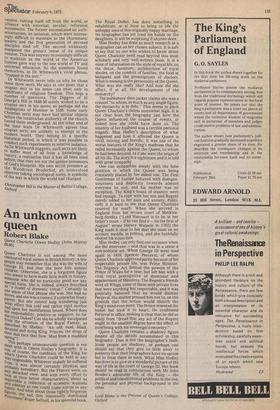An unknown queen
Robert Blake
Queen Charlotte Olwen Hedley (John Murray £6.00)
Queen Charlotte is not among the more celebrated royal names in British history. A few. People may remember that she was the w de of George III, and that she bore him si xteen Children. Otherwise, she is a forgotten figure who seems to have made little mark in history, someone who did no particular good nor any special harm. She is, indeed, always described as cribed as “a model of domestic virtue." Certainly n ne sense of that phrase she was. She had no lovers, and she was a correct if somewhat frosty Parent. But one cannot help wondering just What effect this cold and rather rigid mother Ilad upon her multifarious brood. Where. does her responsibility, positive or negative, he for the royal Dukes? Can she be wholly exculpated fr°ro the situation of the Royal Family, as described by Shelley:. "An old, mad, blind, and dying King. Princes, the dregs of their dull race that flow. Mud from a muddied spring"?
This clealt perhaps unanswerable question is not in t n with in Olwen Hedley's biography. It s in t n with in Olwen Hedley's biography. It s
2,t? of course, the condition of the King for Way Queen Charlotte could be held in any f ay responsible. Whatever malady he suffered IThrl. it was almost certainly physical and Probably hereditary. But the Princes were, on 10.1Y detached view, and with every effort to 1 °k at their better characteristics, about as dePlorable a collection of eccentric wastrels pricil.oddities as one could come across in any
And what about those rightly forgotten ,,,g.tires, the sad, dim, maternally dominated Princesses? Roger Salford, in his splendid book,
The Royal Dukes, has done something to rehabilitate, or at least to bring to life the unhappy sons of this originally happy marriage. No biographer has yet tried his hands on the daughters. It will be surprising if anyone does.
Miss Hedley has done as much research as a biographer can on her chosen subject. It is safe to say that no one who wishes to know about Queen Charlotte need read beyond this most scholarly and very well-written book. It is a mine of information on the style of royal life, on the decor, furniture, architecture of royal abodes, on the conduct of families, the food at banquets and the prescriptions of doctors. What is missing is the personality of the Queen. What was she really like? And how did she affect, if at all, the development of the monarchy? The publishers' dust-jacket claims she was a consort "to whom, as much as any single figure, the monarchy is in debt." This seems to pitch Queen Charlotte's claims somewhat high. It is not clear from the biography just how the Queen influenced the course of events, or indeed how she could have done so. The insanity of her husband was a terrible personal tragedy. Miss Hedley's description of what happened and how it affected the Queen is vivid, moving and horrific. It was one of the worse features of the King's madness that he railed incessantly against the Queen, to whom he had been devoted, as if she were the origin of all his ills. The story is a nightmare and it is told with great sympathy. One .can sympathise deeply with the false position in which the Queen was being constantly placed by her eldest son. The First Gentleman of Europe behaved with disingenuousness and duplicity towards almost everyone he met, and his mother was no exception. The King's bouts of insanity were bad enough. To cope with her son and Regent merely added to her pain and anxiety. Politically it is hard to see that Queen Charlotte counted for much. When she arrived in England from her secure court of Metklenburg-Strelitz ("Lord Harcourt is to be at her father's court — if he can find it — on the first of August" wrote Horace Walpole in 1761) the King made it clear to her that she must on no account meddle in politics, and she faithfully obeyed his injunction.
Miss Hedley can only find one occasion when she did intervene — and that.was in a sense a non-political act. When George III went mad again in 1810, Spencer Perceval, Of whom Queen Charlotte approved partly because of his respectable private life, was Prime Minister. The Regency Act limited the powers of the Prince of Wales for a year, but left him with a vital royal prerogative of dismissal and appointment of Ministers. The Regent's friends were all Whigs, some of them with private lives that were anything but respectable, and it was generally believed that he would dismiss Perceval. His mother pressed him not to, on the grounds that the action would disturb the King's mind even more. The Prince resented the lesson but took it to heart. He confirmed Perceval in office, making it clear that he did so solely from "dread that any act of the Regent might in the smallest degree have the effect of interfering with his sovereign's recovery."
Queen Charlotte remains a shadowy figure despite all the details accumulated in this biography. That is not the biographer's fault. Some people are shadowy, or perhaps one should say that they give so little away to posterity that their biographers have no option but to treat them as such. What Miss Hedley has done is to give us a wonderful picture of the way of life in the court of George III. Her book should be read in conjunction with Mr John Brooke's admirable life of the King — the political and constitutional problems in the one, the personal and physical background in the other.
Lord Blake is the Provost of Queen's College, Oxford


































 Previous page
Previous page